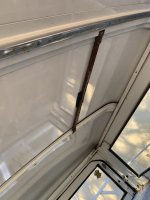Popping hardtop (oil canning)
The problem:
Sometimes when driving on the highway, particularly on a windy day, or when passing a big truck, the hard top makes a popping sound like sheet metal slapping back and forth or “oil canning”. The sound is more or less random, but it is pretty loud. The first time you hear it, you imagine that your hard top sheet metal is undergoing some sort of catastrophic failure, or is going to end up wavy and ruffled with ridges at the end of the drive.
Why it occurs:
No one has done the wind tunnel study, but a some people think it results from lifting of the sheet metal on the roof because of the low pressure that occurs by passage of air over the roof at high speed; kind of like an airfoil. On days when there are high wind gusts, or in the turbulence around a large truck, the flow of air over the top may suddenly change, and that allows the top to snap back to relaxed condition, or it may even be lifted more.
Whatever the ultimate cause, when it snaps back, it contacts support cross members or the oil canning sound of metal flexing is transmitted into the interior.
What to do to fix it:
The flexing of the sheet metal cannot be entirely eliminated, and it is probably not a good idea anyway since there is some need for expansion and contraction just to allow for expansion and contraction with temperature variations. The “fix” that works for most is to reduce the noise by adding some sort of sound suppression or insulation. Simple layers of sound deadening material (such as Dynamat) can reduce the ringing of the metal as it flexes. For those with cardboard headliners, either the sound deadening material or simple foam or interior type insulation glued to the underside of the sheet metal roof can help reduce the sound. Insulation is probably a good idea in sunny climates, since it can reduce the inwardly radiated heat from the metal roof on especially hot days; and it really helps in cold climates where the loss of heat through the roof can be high on clear nights when upward radiation is high.
The problem:
Sometimes when driving on the highway, particularly on a windy day, or when passing a big truck, the hard top makes a popping sound like sheet metal slapping back and forth or “oil canning”. The sound is more or less random, but it is pretty loud. The first time you hear it, you imagine that your hard top sheet metal is undergoing some sort of catastrophic failure, or is going to end up wavy and ruffled with ridges at the end of the drive.
Why it occurs:
No one has done the wind tunnel study, but a some people think it results from lifting of the sheet metal on the roof because of the low pressure that occurs by passage of air over the roof at high speed; kind of like an airfoil. On days when there are high wind gusts, or in the turbulence around a large truck, the flow of air over the top may suddenly change, and that allows the top to snap back to relaxed condition, or it may even be lifted more.
Whatever the ultimate cause, when it snaps back, it contacts support cross members or the oil canning sound of metal flexing is transmitted into the interior.
What to do to fix it:
The flexing of the sheet metal cannot be entirely eliminated, and it is probably not a good idea anyway since there is some need for expansion and contraction just to allow for expansion and contraction with temperature variations. The “fix” that works for most is to reduce the noise by adding some sort of sound suppression or insulation. Simple layers of sound deadening material (such as Dynamat) can reduce the ringing of the metal as it flexes. For those with cardboard headliners, either the sound deadening material or simple foam or interior type insulation glued to the underside of the sheet metal roof can help reduce the sound. Insulation is probably a good idea in sunny climates, since it can reduce the inwardly radiated heat from the metal roof on especially hot days; and it really helps in cold climates where the loss of heat through the roof can be high on clear nights when upward radiation is high.
Last edited by a moderator:














